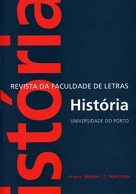O poder concelhio em tempos medievais : o «deve» e «haver» historiográfico
Abstract
In this study, drawing upon the various syntheses that have been examining the medieval historiographical production, one presents an evaluation of the works published about the municipal thematic, especially in the last decade of the 20th century and the early years of the current one. One covers the methodologies and the results obtained in recent works and articles around the development of the municipal movement at the time of its implantation, between the 11th century and beginning of the 14th century, and later on during its maturation period, in the 14th and 15th centuries. On the first stage, one emphasises the better knowledge of the influence networks and agents that converged to the genesis and differentiated identification of these centres of local power, which were later legally sanctioned by the cartas de foral (charters of privilege). Regarding the second period, one pinpoints the variety of analyses of the municipal life, stressing the study of the social elites and the discourse of the municipalities in Courts or in studies of a more economic and legislative nature, that deal with finance and local by-laws, and also the more recent studies that address the municipal written production, the circulation of writings and its more significant symbolic landmarks. Making known what has been done, this work also points to some research and studies’ directions that still have to be pursued within the scope of the multifaceted approach to municipal power in medieval times.Downloads
Published
2018-04-05
How to Cite
Coelho, M. H. da C. (2018). O poder concelhio em tempos medievais : o «deve» e «haver» historiográfico. História: Revista Da Faculdade De Letras Da Universidade Do Porto, 7. Retrieved from https://ojstest.xyz/ojsletrasX/index.php/historia/article/view/3758
Issue
Section
Poderes: as dimensões central e local
License
The authors grant to História the exclusive right to publish their texts, in any form, including their reproduction and sale, in any form, as well as their availability under open-access databases.
The texts published cannot be used in other publications without the express authorization of the Editorial Committee.
All the texts published are protected by a Creative Commons Attribution-NonCommercial (cc-by-nc) License, that allows the sharing of texts, for noncommercial purposes, with attribution of authorship and initial publication in this journal.






